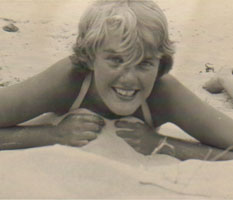Rudely awoken at 4 am by a phone call, my immediate reaction was that my father had  mucked up the time zones from Australia to Japan and was calling with a belated Happy Christmas. I had been so busy on Christmas Day with ski school training I had not even noticed Dad hadn’t called, until the phone rang.
mucked up the time zones from Australia to Japan and was calling with a belated Happy Christmas. I had been so busy on Christmas Day with ski school training I had not even noticed Dad hadn’t called, until the phone rang.
How wrong I was. The phone call was to inform me my mother had died. My beautiful mother. My wonderful, warm, loving, funny and supportive mother, dead!
After what seemed like only a day for mourning, I was back at work. That was what my mother had always said, “If I die, don’t stop what you are doing. It will be too late, just keep going”. I think this was a big mistake, as I now know mourning a loved one is the most vital element to recovery.
Over the years I have reflected on my mother’s life, her influence on me, what she has subsequently missed, and occasionally I wonder what she would be like if she were still alive.
My mother was never really happy with her life. She never seemed to appreciate how beautiful she was and spent most of her life wanting to make other people happy. As a recipient of that love, I blossomed into the person I am today, but it always struck me as odd that she could not understand that her life was OK. She saw herself as a mother and wife and behaved as such. But was that all she was? Did she need to look and act like a mother? Or is there a way to be a mother, be yourself and enjoy both?
Before she died, my mother was just starting to find herself. She and I were at university together but she had waited until I was in Year 11 before going back to school; something she had desperately wanted to do for many years.
We were very close, except perhaps for a few of my teenage years. We had the kind of confiding relationship only mothers and daughters have. She often told me she felt intellectually inadequate, having been forced to leave school as a teenager and work to support her family. She also felt dumb around my father’s friends, a thought that still saddens me.
My mother’s foray back into education happened after many hours convincing her that my brothers and I would be fine. I recall being frustrated by her determination to put her family’s needs before her own when I could see that she could do both. What was particularly sad was that in her 3rd year of university, at the age of 52, finally having found happiness and intellectual stimulation, she died.
She never really appreciated how much my father adored her. I believe he would have supported her in anything she did. She was only just starting to understand that her children adored her (although we gave her a very hard time). However, I think the most important lesson for me was that she only started feeling good about herself when she was doing something for herself. Her study transformed her. I still remember the day she got her HSC at 47. I remember seeing how proud she was being accepted into Monash University as a mature age student. But my best memory is of finally seeing my mother stand tall and be herself.
Challenging ourselves to be more than we are, to refuse mediocrity in our lives, and to take responsibility for our own happiness are all possible. The difficulty is in firstly allowing ourselves to do so, then knowing how to go about it.
When you have reached the point where you feel “there is something I am missing”, then you are at the point to contact Jane Stott at Connecting. Jane will help you make the connections you need to “go from being a her to being a me”.
